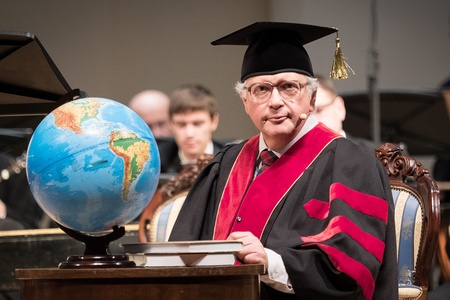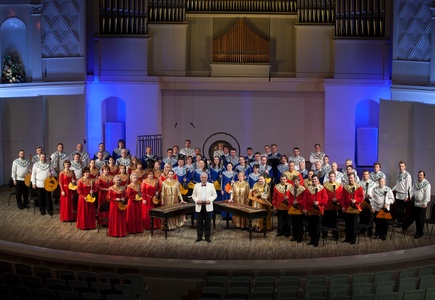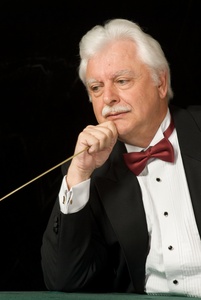A Funny Professor.
Around the World with Jules Verne
December 2, 2017
Tchaikovsky Concert Hall
directions to the hallProgram:
Around the World with Jules Verne

Subscription №187:
A Funny Professor. 9th Season. True Stories and Fiction
The Ossipov Balalaika Orchestra
The history of The Ossipov Balalaika Orchestra founded in 1919 by two prominent musicians, balalaika player Boris Troyanovsky and domra player Pyotr Alexeyev, is full of triumphs, quests for perfection and unexpected twists of fate. The Orchestra, which was the first Moscow-based orchestra of folk Instruments, started touring the USSR soon after its first concert, performing in nearly every region of the enormous country, from Sakhalin to the Carpathians, from the White Sea to the Caucasus.
Meanwhile, the changed twice its official name, becoming the All-Russian Radio Committee Folk Instruments Orchestra in 1928, and renamed the State Folk Instruments Orchestra of the USSR in 1936.
Appointing prominent Soviet musician Nikolay Ossipov as its Chief Conductor and Music Director in 1940 marked a new page in the Orchestra’s history. When he passed away, Dmitry Ossipov took over. He changed the team’s performing techniques in a significant way, adding new instruments such as gusli and button accordion, and introducing works for balalaika duos and unison. New pieces were also commissioned from N. Boudashkin, A. Novikov, A. Kholminov, and other composers. Nikolay Ossipov ended up introducing to the audience a completely new orchestra with infinite performing capacities, eager to perform any kind of music, from simple arrangement of folk songs to symphonies.
In June 1941, when World War II started, the Orchestra was disbanded, and almost all the musicians went to fight. In September 1942, however, the Soviet Government decided to reconvene the ensemble. Nikolay Ossipov and manager Boris Romanov brought a lot of musicians back to Moscow. The Orchestra was reestablished and got new official name: the State Russian Folk Orchestra. Numerous concerts were given during the war at different front lines. The last of these “war concerts”, dedicated to the Great Victory, was played in the Kremlin.
In 1946 the Orchestra was named after Nikolay Ossipov. Over the following years, the Ossipov Balalaika Orchestra was headed by Dmitry Ossipov, Viktor Smirnov, Vitaly Gnutov, Viktor Dubrovsky, and Nikolay Kalinin. Prominent conductors who have conducted the OBO include Nikolay Golovanov, Nikolay Anossov, Alexander Gauk, Gennady Rozhdestvensky, Veronika Dudarova, and Vladimir Fedoseyev, to name a few.
In 1969, the OBO received an honorable title of the Academic Orchestra. In June 1996, the Russian Ministry of Culture gave the Orchestra a new official name: the Ossipov National Academic Folk Instruments Orchestra of Russia.
Viktor Dubrovsky, often referred to as “a Russian genius”, opened a new page in the Orchestra’s history. It was under his baton that the musicians’ performance reached a new quality level. OBO began performing arrangements of Russian, European and Soviet classical masterpieces including works of Rossini, Mendelssohn, Glinka, Mussorgsky, Stravinsky, Shostakovich, Sviridov, and Shchedrin.
Performing under Nikolay Kalinin was inspiring in many ways for the Ossipov orchestra and, yet it was the time of hard and meticulous work. Maestro Kalinin identified three pillars of the Orchestra’s evolution: strong professionalism, original and spectacular repertoire, and educational activities.
Vladimir Ponkin became the Orchestra’s Artistic Director and Principal Conductor in 2005. Since 2009, this position has been held by Vladimir Andropov, one of Russia’s most talented and prominent conductors. Under his guidance, the Orchestra keeps preserving and developing the Russian folk music tradition.







